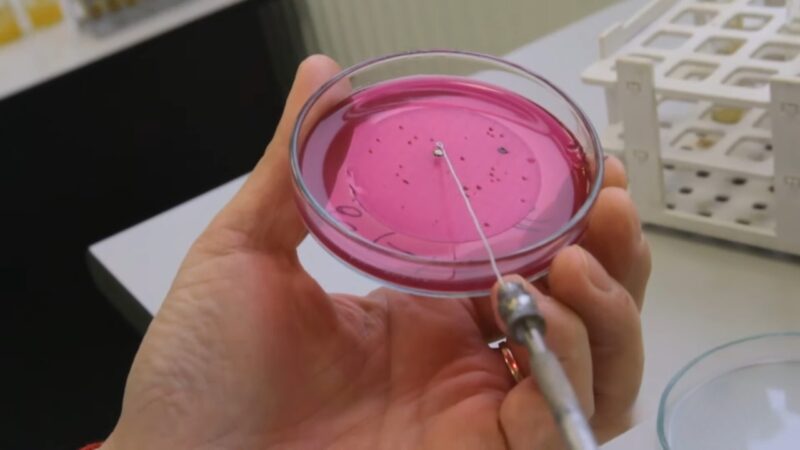Low sperm motility, often referred to as asthenozoospermia, is one of the common challenges many couples face when trying to conceive. It refers to the percentage of sperm that can move forward in a straight line.
A lower percentage can make it difficult for sperm to reach and fertilize an egg. In that case, proper treatment is essential.
The Basics

What Is Sperm Motility?
Sperm motility refers to the ability of the sperm to move efficiently. For fertilization to occur, sperm must swim through the cervix, into the uterus, and then into the fallopian tubes.
If the sperm cannot make this journey due to low motility, conception becomes difficult.
Causes of Low Sperm Motility
Several factors can contribute to low sperm motility, including:
- Lifestyle choices such as smoking, excessive alcohol consumption, and drug use.
- Medical conditions like infections, varicoceles, and hormone imbalances.
- Environmental factors, including exposure to certain chemicals and radiation.
Boosting Sperm Motility
Diet and Supplements
- Antioxidants: Foods rich in antioxidants can improve sperm health. This includes foods like berries, nuts, and citrus fruits.
- Zinc and Folic Acid: Studies have shown that zinc and folic acid supplements can enhance sperm health.
- Omega-3 Fatty Acids: Found in fish and flaxseeds, they can improve sperm motility.
Lifestyle Changes
Making specific lifestyle changes can have a positive impact on sperm health:
- Avoiding Heat: Prolonged exposure to heat can affect sperm production. It’s advisable to avoid hot tubs and tight-fitting underwear.
- Limit Alcohol and Caffeine: Excessive consumption can reduce sperm motility. It’s best to consume them in moderation.
- Exercise Regularly: Regular exercise can improve sperm health, but excessive training can have the opposite effect.
Medical Interventions
The Effects of Coital Lubricants
Most people will think about various drugs when it comes to finding the right solution. However, there are some simple solutions that could lead to significant improvements.
According to Sheena E M Lewis and Neil Mcclure from Queen’s University Belfast, All lubricants, except baby oil, significantly decreased percentage progressive motility, progressive velocity, curvilinear velocity, and lateral head displacement at a concentration of 12.5%.
“ At a lower concentration of 6.25%, both olive oil and saliva still significantly reduced progressive motility parameters, while KY jelly diminished head movement parameters. The study concluded that even at these very low concentrations, coital lubricants impair sperm motility and may adversely affect fertility”.
There are many other potential solutions. However, it depends on the condition. In that matter, visiting your doctor is crucial. A lot of people are making the same mistake when they are trying to achieve results on their own, simply by relying on data found online. Parenthood also requires a lot of planning.
Therefore, keep in mind that you will have to research all kinds of things. Also, women have to be aware of the changes that will occur, such as body acne, nausea, and more.
Hormonal Treatments
Sometimes, an imbalance in hormones can lead to low sperm motility. In such cases, doctors might prescribe hormone treatments or medications. There is also a common mistake made by people where they will choose various products online.
You should never test hormonal products without previous consultation with a doctor. Also, be sure that you are buying them only from licensed and well-known distributors.
Other Solutions
As we already mentioned, there are different causes and conditions. Therefore, the solution is individual. In case you cannot improve the motility, there are still other ways where your wife can get pregnant.
Intrauterine Insemination (IUI)
-
What Is IUI?
IUI is a procedure where sperm is collected, concentrated, and directly placed in the uterus around the time of ovulation. This reduces the distance sperm needs to travel, giving them a better chance to reach the egg.
-
How Does it Help?
For men with low sperm motility, IUI can be beneficial. By placing the sperm closer to the egg, it increases the chances of one of the sperm cells fertilizing the egg. It’s less invasive and more affordable than some other fertility treatments.
In Vitro Fertilization (IVF) with Intracytoplasmic Sperm Injection (ICSI)

-
Understanding IVF with ICSI
IVF involves retrieving eggs from the woman’s ovaries and fertilizing them in a lab. With ICSI, a single sperm is injected directly into an egg, which can be particularly helpful when sperm motility is an issue.
-
Why Choose IVF with ICSI?
For severe cases of low sperm motility, ICSI can be a game-changer. It bypasses the need for the sperm to travel and penetrate the egg on its own. While it’s more invasive and costly than IUI, it has a higher success rate for couples dealing with significant motility issues.
Emotional and Psychological Support

The Importance of Support
Dealing with fertility issues can be emotionally challenging. It’s essential to remember that you’re not alone, and seeking support can make the journey more manageable.
Seeking Professional Help
Counselors or therapists specializing in fertility issues can provide coping strategies. They offer a safe space to express feelings and navigate the emotional roller-coaster that often accompanies fertility treatments.
Joining Support Groups
Support groups, whether online or offline, can connect you with couples facing similar challenges. Sharing experiences and tips can be comforting and enlightening.
3 Tips for the Partner

1. Understanding and Empathy
It’s essential to remember that fertility issues can be a sensitive topic for many. As a partner, showing understanding and empathy can make a world of difference. Avoid placing blame and instead focus on being a pillar of support.
2. Educate Yourself
The more you know about low sperm motility, the better equipped you’ll be to support your partner. Attend doctor’s appointments, ask questions, and do your research. This not only shows your commitment but also helps in making informed decisions together.
3. Engage in Joint Activities
Engaging in joint activities, whether it’s attending counseling, exercising together, or simply going for walks, can strengthen the bond between partners. It serves as a reminder that you’re in this journey together, facing challenges and celebrating successes as a team.
Alternative Paths to Parenthood

Adoption
For some couples, after weighing all options and perhaps trying various treatments, they might consider adoption as a way to realize their dreams of parenthood. Adoption can be a fulfilling path, providing a loving home to a child in need.
Surrogacy
Another option for couples is surrogacy, where another woman carries and gives birth to a child for them. This can be an option if there are other fertility issues at play in addition to low sperm motility.
Donor Sperm
Using donor sperm is another alternative. Some couples choose this route when they’ve tried other treatments without success. It’s essential to thoroughly research and consider the emotional and legal aspects of this option.
FAQs

What Is the Difference Between Sperm Motility and Sperm Count?
Sperm motility refers to the ability of the sperm to move efficiently, while sperm count indicates the number of sperm present in a specific volume of semen. Both factors are vital for fertility, but a high sperm count doesn’t necessarily mean the sperm can move efficiently.
Is Low Sperm Motility a Permanent Condition?
Not necessarily. Low sperm motility can be influenced by various factors, including lifestyle choices, medical conditions, and environmental factors. By addressing these factors, such as improving diet, making lifestyle changes, or seeking medical interventions, it might be possible to improve sperm motility.
Are There Any Specific Signs or Symptoms of Low Sperm Motility?
Typically, low sperm motility doesn’t present with noticeable symptoms. Most men discover they have this condition when trying to conceive without success and then undergoing fertility testing. However, underlying causes like infections or varicoceles might have associated symptoms.
Does Age Affect Sperm Motility?
Yes, age can impact sperm motility. As men age, there can be a gradual decrease in the quality of sperm, including its motility. However, other factors like lifestyle and overall health play a more significant role than age alone.
How Often Should One Get Tested if Suspecting Low Sperm Motility?
If a couple is having difficulty conceiving, it’s advisable to consult a fertility specialist. Initially, a semen analysis will be performed. If abnormalities are detected, the doctor may recommend repeat tests over a few months to get consistent readings, as sperm quality can vary from one sample to another.
Summary
As you can see, there are different solutions available, which means that there is still a high chance that you will manage to reach the right results. However, that will require some time and change of certain habits.

